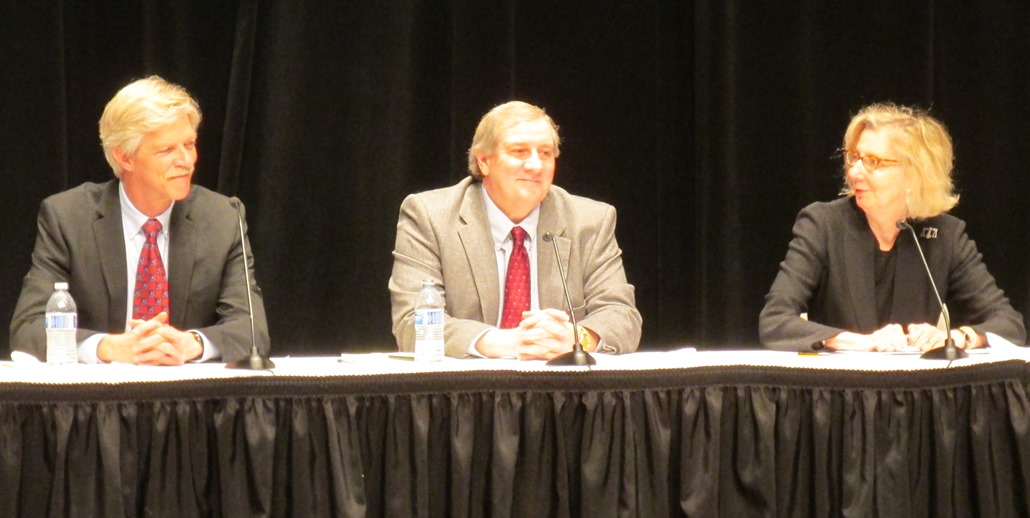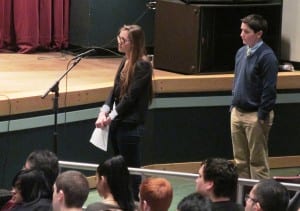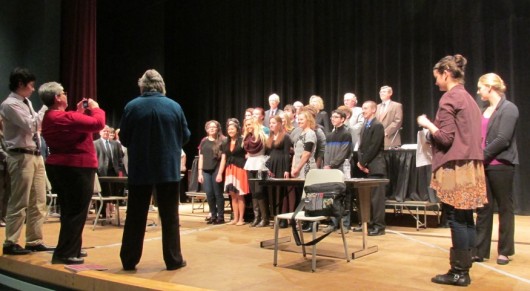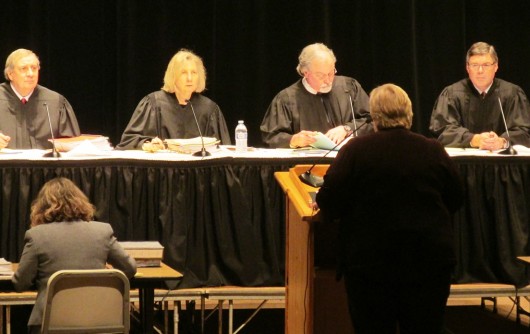
The Alaska Supreme Court listens to state attorney Mary Lundquist during the Supreme Court live event.
Alaska’s Supreme Court was in Ketchikan this week – all five members. They were here for Supreme Court Live, during which the court hears oral arguments for a real case. But instead of a courtroom, it’s heard at a high school. Chief Justice Dana Fabe was joined on the Ketchikan High School auditorium stage by Justices Daniel Winfree, Craig Stowers, Peter Maassen and Joel Bolger.
They heard arguments from both sides in the State of Alaska versus Central Council of Tlingit and Haida, a case that will decide whether Alaska’s tribal courts have the right to determine child support.
In the audience, Kayhi’s approximately 800-seat auditorium was packed, mostly with students, although some members of the public attended the event, as well.
Here’s the opening of the event: “May it please the court, my name is Mary Lundquist and I
represent the State of Alaska in this matter.”
Teachers sprinkled throughout the auditorium had to shake a few sleeping students, and shush some whispered gossip sessions. But overall, the kids did a pretty good job paying attention as attorneys for the state, the U.S. government and Central Council offered arguments on both sides of the matter.
OK, I’m going to try to simplify and summarize here, but keep in mind that this is a very complicated case and I’m just barely scratching the surface. Basically, the U.S. government gave money to Central Council to set up a tribal child support program. The tribe started issuing child support orders, and asked the state to enforce those orders. The state refused, arguing that the tribes don’t have jurisdiction over child support. The tribe sued the state in Superior Court and won, and now the state has appealed that decision.
Here’s state attorney Mary Lundquist again, arguing that tribes have limited jurisdiction: “They have some attributes of sovereignty over their land and their people, and in Indian Country, tribes have a heightened interest in self-government that might extend to both members and non-members. But the U.S. Supreme Court has stated in the absence of tribal ownership, it is virtually conclusive of the absence of tribal civil jurisdiction.”

Students line up o ask questions of the attorneys following oral arguments in the Supreme Court Live event.
That means Alaska doesn’t have much in the way of “Indian Country,” which is reservations such as those Down South. Metlakatla is the only reservation in the state.
Because of that, the state argues that the tribes in Alaska have less legal jurisdiction, especially over non-tribal-members, than a tribe in the Lower 48 has over people living within its borders.
The tribe disagrees, at least on the question of child support. Holly Handler of Alaska Legal Services, representing Tlingit and Haida, argues that tribes already are allowed to decide child custody for members.
“So if Central Council can decide where a child can live, who a child should live with, who a child can visit; you know that Central Council has the authority to terminate parental rights in children’s cases,” she said. “So the question here is whether Central Council’s authority also includes the ability of Central Council to determine what amount of support is appropriate for a child to receive to meet their basic daily needs.”
The U.S. government sent attorney Stacy Stoller to argue on the side of Tlingit and Haida.
“We sought to participate here because we’re greatly concerned that the state’s blanket refusal to enforce any and all of the tribe’s child support orders here interferes directly with the administration of the federal Child Support Enforcement Program,” she said. “The U.S. agrees with the tribe that tribes retain inherent tribal sovereignty to determine the appropriate support for tribal children.”
Attorneys on both sides were led through complicated discussions with the justices over subject matter jurisdiction versus personal jurisdiction. Basically, that’s the difference between an issue and an individual. The concern is whether a tribal court has the power to establish how much child support a non-Native parent must provide for a child who is a tribal member.
OK, so the case is interesting. But what’s fun is that the students were paying attention, and they had questions when it was all over. There were two question sessions, one with
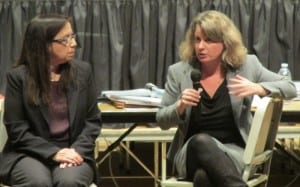
Stacy Stoller, representing the federal government, answers a question while Jessie Archibald of Tlingit and Haida listens.
just the attorneys and another with the Alaska Supreme Court. Here’s one of the questions for the attorneys.
“Hi. I’m Cody. I have a question for (Lundquist). Why are you against this?”
Lundquist answered that “It’s not a question of whether the state is against a tribe or against tribal members. It goes to the essential question that was presented in this case. It’s a jurisdictional matter. And tribes are domestic dependent nations with limited sovereignty. And applying the tests set out by the U.S. Supreme Court, this was our analysis.”
When the Supreme Court returned for its question-and-answer session, a young woman asked Chief Justice Dana Fabe how her experience as a woman has affected her experience on the court. Fabe says everybody’s individual life experience is valuable.
“We try very hard to set aside our personal views about policy issues and decide the case only based on the facts and on the law, but my experiences as a woman are different in the sense that I’m a wife and I’m a mom, from my male colleagues,” she said.
Justice Craig Stowers broke in to point out that Fabe is the first female Alaska Supreme Court justice, and the first female chief justice of the state’s highest court.
Ketchikan’s Assistant District Attorney Ben Hofmeister is the one who encouraged the Alaska Supreme Court to consider Ketchikan for a Supreme Court Live event. After the two-plus hour program wrapped up, he said it went well and he’s pleased with the questions some of the students came up with. Hofmeister says Supreme Court Live is a great outreach effort.
“The chief justice said at the beginning that one of the big things they want is to inspire kids to do things like become lawyers. I don’t know if you have that here, but at the very least, you have kids getting interested in what the law is and how it impacts them,” he said. “I’m hoping maybe one or two.”
Supreme Court Live is a relatively new program, and this is the first time it’s come to Ketchikan. The state’s highest court has had similar events at high schools in Sitka, Barrow, Anchorage, Fairbanks and Juneau. The program began under former Chief Justice Walter Carpeneti, who retired a couple years ago.

